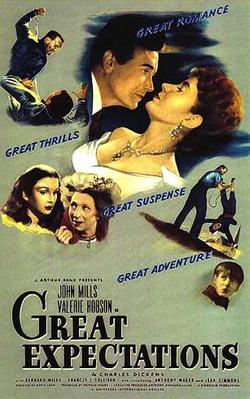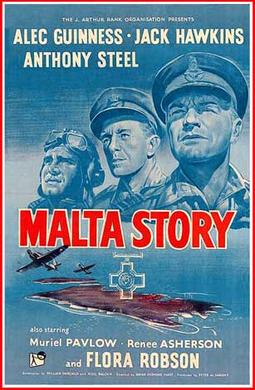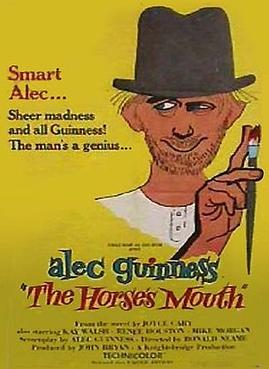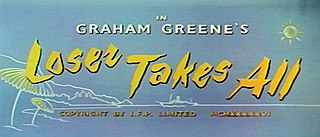
The Lavender Hill Mob is a 1951 British comedy film from Ealing Studios, written by T. E. B. Clarke, directed by Charles Crichton, starring Alec Guinness and Stanley Holloway and featuring Sid James and Alfie Bass. The title refers to Lavender Hill, a street in Battersea, a district in London SW11, near to Clapham Junction railway station.

Kind Hearts and Coronets is a 1949 British crime black comedy film directed by Robert Hamer. It features Dennis Price, Joan Greenwood, Valerie Hobson and Alec Guinness; Guinness plays eight characters. The plot is loosely based on the novel Israel Rank: The Autobiography of a Criminal (1907) by Roy Horniman. It concerns Louis D'Ascoyne Mazzini, the son of a woman disowned by her aristocratic family for marrying out of her social class. After her death, a vengeful Louis decides to take the family's dukedom by murdering the eight people ahead of him in the line of succession to the title.

Oliver Twist is a 1948 British film and the second of David Lean's two film adaptations of Charles Dickens novels. Following his 1946 version of Great Expectations, Lean re-assembled much of the same team for his adaptation of Dickens' 1838 novel, including producers Ronald Neame and Anthony Havelock-Allan, cinematographer Guy Green, designer John Bryan and editor Jack Harris. Lean's then-wife, Kay Walsh, who had collaborated on the screenplay for Great Expectations, played the role of Nancy. John Howard Davies was cast as Oliver, while Alec Guinness portrayed Fagin and Robert Newton played Bill Sykes.

The Man in the White Suit is a 1951 British satirical science fiction comedy film made by Ealing Studios. It stars Alec Guinness, Joan Greenwood and Cecil Parker and was directed by Alexander Mackendrick. The film was nominated for an Academy Award for Best Writing (Screenplay) for Roger MacDougall, John Dighton and Alexander Mackendrick.

Genevieve is a 1953 British comedy film produced and directed by Henry Cornelius and written by William Rose. It stars John Gregson, Dinah Sheridan, Kenneth More and Kay Kendall as two couples comedically involved in a veteran automobile rally.

Ernest Frederic Graham Thesiger, CBE was an English stage and film actor. He is noted for his performance as Doctor Septimus Pretorius in James Whale's film Bride of Frankenstein (1935).

Great Expectations is a 1946 British drama film directed by David Lean, based on the 1861 novel by Charles Dickens and starring John Mills and Valerie Hobson. The supporting cast included Bernard Miles, Francis L. Sullivan, Anthony Wager, Jean Simmons, Finlay Currie, Martita Hunt and Alec Guinness.

Last Holiday is a 2006 American romantic comedy-drama film directed by Wayne Wang and written by Jeffrey Price and Peter S. Seaman. The film is loosely based on the 1950 British film of the same name by J. B. Priestley. The film stars Queen Latifah as Georgia, a humble department store assistant who is told that she has a rare brain condition and only has a few weeks to live. She promptly decides to spend her remaining funds on a luxury holiday in Europe before she dies.

Malta Story is a 1953 British war film, directed by Brian Desmond Hurst, which is set during the air defence of Malta during the Siege of Malta in the Second World War. The film uses real and unique footage of the locations at which the battles were fought and includes a love story between a RAF reconnaissance pilot and a Maltese woman, as well as the anticipated execution of her brother, caught as an Italian spy. The pilot is loosely based on Adrian Warburton; the Maltese woman's brother is based on Carmelo Borg Pisani, who was executed in 1942.

The Horse's Mouth is a 1958 film directed by Ronald Neame and filmed in Technicolor. Alec Guinness wrote the screenplay, which was based on the 1944 novel The Horse's Mouth by Joyce Cary. Guinness also played the lead role of Gulley Jimson, a London artist.

Father Brown is a 1954 British mystery comedy film directed by Robert Hamer and starring Alec Guinness as the title character with Joan Greenwood, Peter Finch and Cecil Parker. Like the American film Father Brown, Detective (1934), it is based loosely on The Blue Cross (1910), the first Father Brown short story by G. K. Chesterton. It was shot at the Riverside Studios in London. The film's sets were designed by the art director John Hawkesworth. It was distributed by Columbia Pictures in both Britain and the United States where it was released as The Detective. It was screened at the 1954 Venice Film Festival.

Beatrice Campbell was a Northern Irish stage and film actress, born in County Down, Northern Ireland,

The October Man is a 1947 mystery film/film noir starring John Mills and Joan Greenwood, written by novelist Eric Ambler, who also produced. A man is suspected of murder, and the lingering effects of a brain injury he sustained in an earlier accident, as well as an intensive police investigation, make him begin to doubt whether he is innocent.

The Magnet is a 1950 British black and white comedy film directed by Charles Frend, featuring Stephen Murray, Kay Walsh, and in his first starring role James Fox. A young Wallasey boy obtains a magnet by deception, leading to much confusion. When he is acclaimed as a hero, he is shamed by his own sense of guilt.

Loser Takes All is a 1956 British comedy film directed by Ken Annakin, starring Glynis Johns, Rossano Brazzi, and Robert Morley, with a screenplay by Graham Greene based on his 1955 novella of the same name.

Meet Me Tonight is a 1952 omnibus British comedy film adapted from three one act plays by Noël Coward: Red Peppers, Fumed Oak and Ways and Means; which are part of his Tonight at 8.30 play cycle. The film was released as Tonight at 8:30 in the U.S. It was directed by Anthony Pelissier and starred Valerie Hobson, Nigel Patrick, Stanley Holloway, Ted Ray and Jack Warner.

Mario Zampi was an Italian film producer and director. A co-founder of Two Cities Films, a British production company, he is most closely associated with British comedies of the 1950s. He later formed his own film production companies, Anglofilm and Mario Zampi Productions.

The Card is a 1952 British comedy film version of the 1911 novel by Arnold Bennett. In America, the film was titled The Promoter. It was adapted by Eric Ambler and directed by Ronald Neame. It stars Alec Guinness, Glynis Johns, Valerie Hobson, and Petula Clark. The film was nominated for the Academy Award for Best Sound.

Brothers in Law is a 1957 British comedy film directed by Roy Boulting and starring Richard Attenborough, Ian Carmichael, Terry-Thomas and Jill Adams. The film is one of the Boulting brothers successful series of institutional satires that begun with Private's Progress in 1956. It is an adaptation of the 1955 novel Brothers in Law by Henry Cecil, a comedy set in the legal profession.
Robert Clark (1905–1984) was a Scottish film executive best known for being head of production at Associated British Picture Corporation in the late 1940s and 1950s. It was a successful time for the company, films including The Dam Busters (1955).



















